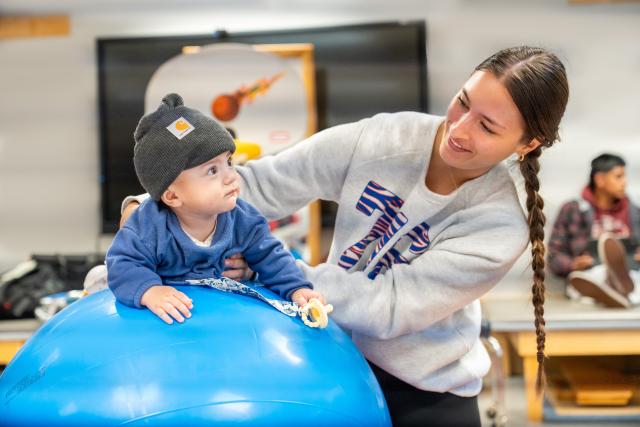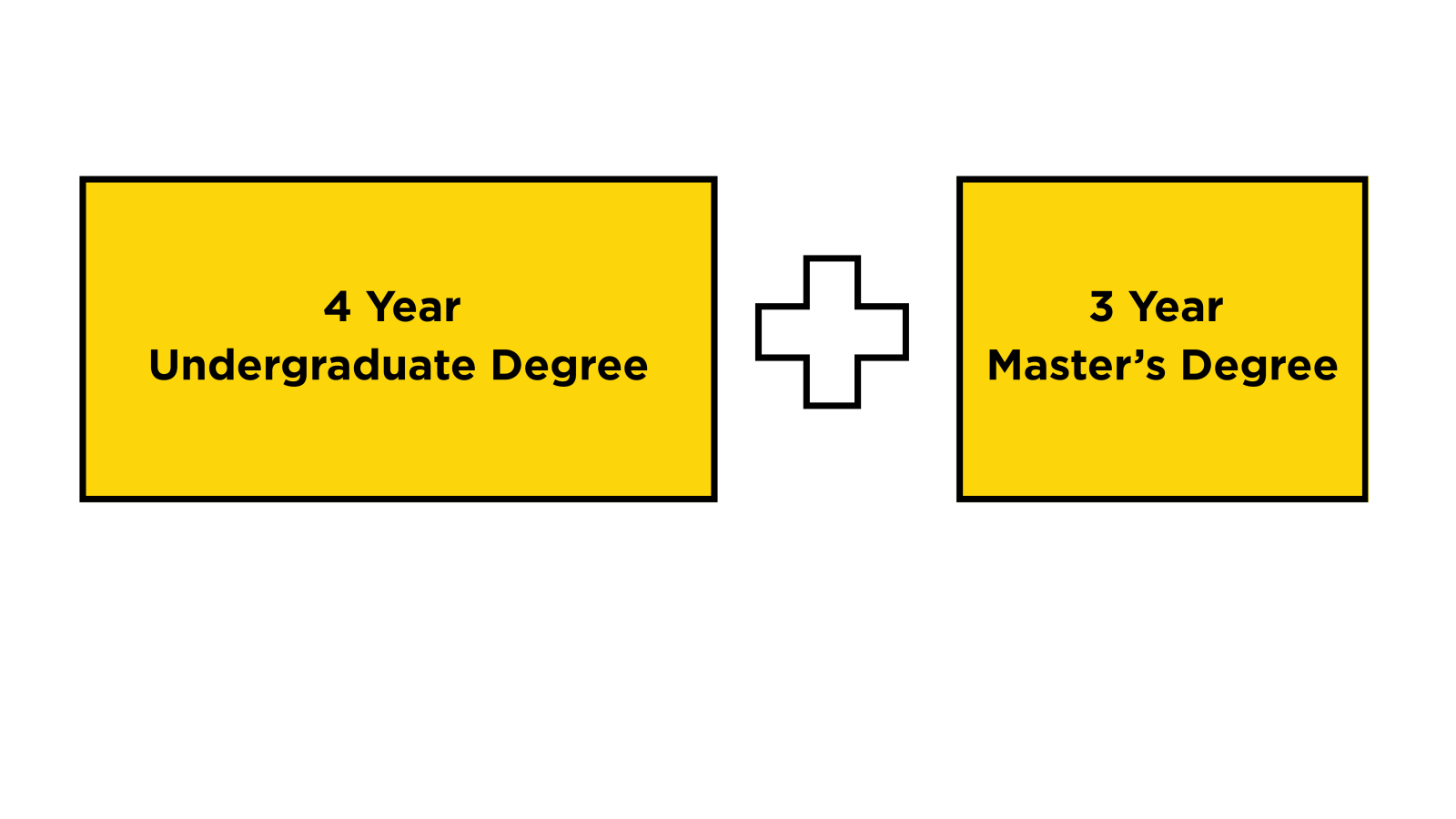
Pre-Occupational Therapy
- School of Health Professions
- Occupational Therapy
- Undergraduate (BS) + Masters (MS)
- 6-7 Years

Begin a Journey That Transforms Lives
Turn your passion for helping others live healthier, more independent lives into a rewarding career in healthcare. The Pre-Occupational Therapy Pathway at D’Youville University is an undergraduate pre-health route designed to prepare students for advanced study and direct entry into the Master of Science in Occupational Therapy (MS OT) program. Students develop a strong foundation in human anatomy, neuroscience, and rehabilitation sciences while gaining the skills and empathy needed to help individuals improve daily function and quality of life.
Job Titles to Explore
| Employment Settings to Explore
|
Why D'Youville
- Collaborative Learning: Train in D’Youville’s Interdisciplinary Education Lab with students from seven other healthcare majors to improve teamwork and patient outcomes.
- Small Classes: Enjoy personalized attention in labs, seminars, and courses led by expert faculty.
- Extensive Fieldwork: Access over 400 clinical sites across diverse healthcare settings for hands-on experience.
- Engaged Campus Life: Live on campus for your first two years—building community and academic success.
- Professional Recognition: Qualify for the Alpha Rho Chapter of Pi Theta Epsilon, the national OT honor society.
- Holistic Education: Gain a well-rounded foundation through studies in the arts, sciences, and humanities alongside professional coursework.
Pathway Options:
You can choose to apply to enter the Masters of Occupational Therapy (MS) degree from any program, but we recommend enrolling into one of the following as the Pre-Occupational Therapy (OT) Pathways to best align yourself to the curricular requirements and ensure prerequisite courses are completed:
- Psychology (BA)
- Exercise Sports Studies (BS)
- Biology (BS)
There are two tracks to set yourself up for applying to the Occupational Therapy (MS) program. These options allow completion of the undergraduate and doctoral program in 7 years.
OT Early Assurance:
D’Youville sets aside a number of early assurance seats available to exceptional first-time-in-college students each year. This early assurance pathway allows students to enroll directly into the Masters of Occupational Therapy program without having to submit an additional application through OTCAS provided you complete all prerequisites, maintain academic standards, and meet graduate admission standards.
Pre-OT Advisory Track:
Students who are not eligible for early assurance can still take the Pre-OT undergraduate prerequisite courses, then apply to the Masters of Occupational Therapy (MS) program upon completion of their undergraduate degree.


There's a genuine sense of community at DYU that makes the learning experience not only educational but also personally enriching. It's the kind of environment where some professors aren't just educators; they're mentors and sometimes even friends. The smaller class sizes foster a more intimate learning experience, encouraging interactions and discussions that might not be as feasible in larger settings. This unique aspect of DYU has undoubtedly enriched my time there, making it a memorable and invaluable part of my academic journey.
Admission Requirements
At D'Youville, we are committed to selecting students who are academically well-rounded and committed to meeting the challenges of a high-quality education. If you have been successful in a traditional college preparatory program in high school, you should be well-prepared for the academic challenges at D'Youville. While we don't require you to submit ACT or SAT test scores, if you have taken or intend to take a standardized test we encourage you to submit your scores if you'd like them to be evaluated as part of your application.
First Time in College Freshman Requirement
- Submitted application for admission
- Applications are free of charge and can be found on our Apply: First Time in College webpage.
- Official high school transcripts
- A high school average of at least 85 percent.
- Students must also demonstrate successful completion of the following high school courses: two years of math, one year of biology, and one year of chemistry. Physics is strongly recommended. Students who have not taken high school chemistry will be considered for admission with the understanding that a college preparatory chemistry course must be taken before beginning the curriculum
Not Required (utilized in a holistic review for admission if provided):
- Standardized SAT/ACT test scores
- Admissions essay
- Letters of recommendation
Transfer Admission Required Review Criteria:
- Submitted application for admission
- Applications are free of charge and can be found on our apply webpage.
- Official transcripts from ALL previously attended colleges/universities
- Cumulative GPA of 2.5
Not Required (utilized in a holistic review for admission if provided):
- Coursework relevant to major of interest
- Admissions essay
- Letters of recommendation
Technical Standards and Essential Functions
Occupational Therapists (OTs) are health-related professionals who are experts in evaluating performance skills used by people in everyday activities, and in planning and providing therapeutic intervention to improve and enable function in the home, school, workplace, and community. OTs analyze, select, adapt, design, and implement therapeutic activities for patients, clients, and children whose ability to cope with daily living and perform necessary tasks is compromised by illness, injury, developmental deficiencies, physical impairments, psychological disorders, social inadequacies, the aging process, or environmental deprivation.
OTs provide services in a multitude of settings and situations with a wide range of individuals of various ages, special needs, socio-cultural backgrounds, roles, abilities, and disabilities. The OT department at D’Youville intends to graduate well-prepared entry-level general practitioners, who are team players, ready to ethically and competently practice, effectively document, knowledgeably research, and advocate for those in need of OT services. OTs are responsible for the safety and effectiveness of service delivery with an aim toward achieving health, well-being, and participation in life through engagement in meaningful, purposeful occupations.
In order to competently function in the rigorous educational program and as an OT in practice settings that may involve heavy workloads and stressful situations, an individual must be proficient in certain cognitive, intellectual, interpersonal, social-emotional, communication, physical, psychomotor, and sensory-perceptual-motor abilities as well as demonstrate compassion, professional attitudes, and ethical behaviors. The faculty is committed to an educational environment where students, with or without disabilities, may develop cognitively, emotionally, spiritually, socially, and professionally.
Therefore, the following technical standards must be met with, or without, reasonable accommodations consistent with the Americans with Disabilities Act. The purpose of the technical standards is to delineate specific expectations and abilities for successful student performance in the classroom, laboratory, fieldwork sites, and clinical education environments. Technical standards must be met at enrollment, matriculation into, continuation in, and completion of the OT educational program. Inability to attain and comply with these technical standards may prevent admission to the OT program, or if the enrolled student becomes unable to fulfill these technical standards, with reasonable accommodations, it may result in course failure, withdrawal, or dismissal from the department.
Applicants with disabilities or physical challenges, who are otherwise qualified, must discuss considerations for reasonable accommodations with the Coordinator of Accessibility Resources at D’Youville College by phone at 716-829-7728. Verification and documentation of the disability by a qualified professional, such as a physician or psychologist, is needed before reasonable accommodations are made. Accommodations will not be considered reasonable if they affect the substance of the OT education program, compromise the educational standards, the integrity of the curriculum, and/or negatively affect the safety of students and/or other people, including patients/clients/children, with whom they may come into contact during the course of their studies. If accommodations are provided, this information will be kept in strict confidence, and it is the student’s responsibility to divulge the disability and need for reasonable accommodations while on fieldwork.
All OT applicants must review the technical standards described in this document and perform a self-evaluation to determine whether they are able to attain and maintain compliance with them. A signed copy of this form must be returned to the OT department, signifying the standards have been read and certifying acceptance of the responsibilities and compliance with the standards.
ESSENTIAL FUNCTIONS:
Critical Thinking and Reasoning
- Technical Standards
- Critical thinking ability for analysis, synthesis, evaluation, planning, reasoning, problem solving, sound judgment, and mathematical calculations
- Examples (Not All Inclusive)
- Evaluate individuals, analyze and interpret findings and data; develop occupational profile, identify needs and strengths, use clinical reasoning to plan intervention, assess outcomes; research, interpret, understand statistics, and apply information for evidence-based practice
Interpersonal Skills and Psychosocial- Emotional Self-Regulation
- Technical Skills
- Interpersonal abilities sufficient to interact with individuals, families, and groups from a variety of social, emotional, religious, ethnic, cultural, racial, sexual, and intellectual backgrounds and lifestyles
- Examples (Not All Inclusive)
- Therapeutic use of self to establish rapport with patients and colleagues; Demonstrate empathy; Use therapeutic communication (active listening, attending, clarifying, coaching, facilitating, teaching); Function as a part of a team (consult, negotiate, advocate, cooperate, and lead).
Communication Ability
- Technical Skills
- Communication abilities sufficient for effective and professional interaction with others in spoken and written English, and through electronic or technological devices; Speak in front of a group of people
- Examples (Not All Inclusive)
- Explain intervention procedures and carry-over methods; conduct teaching-learning procedures; Document and interpret evaluation information; Compose professional reports and records; Share information and participate in discussions; Enter, transcribe, and maintain information in virtual formats; Computer access to send/receive email and course documents
Physical Strength and Endurance
- Technical Skills
- Remain continuously on task (mentally and physically) for several hours while standing, sitting, moving, lifting, reaching, carrying, bending, pushing, pulling, kneeling, walking, stabilizing, and/or interacting
- Examples (Not All Inclusive)
- Move within facilities to various rooms and transport individuals to and from OT; Manual procedures and facilitation techniques for neuromusculoskeletal conditions; Lifting, transferring, and positioning individuals in wheeled mobility equipment and adaptive positioning devices
Gross Motor Coordination and Mobility
- Technical Skills
- Physical abilities sufficient to maneuver in surroundings; Full functional range of motion; Plan, sequence, and coordinate movements. Maintain or regain body balance to stay upright; Jump, stoop, throw, and catch objects.
- Examples (Not All Inclusive)
- Move around in patients’ rooms, small work spaces, and shared OT treatment areas; Accompany or assist individuals in outdoor or community areas and balance on uneven surfaces; Use proper body mechanics when lifting; Use transportation systems to fieldwork, practicum sites, and home visits; Demonstrate evaluation items on standardized tests
Fine Motor, Eye-hand Coordination and Psychomotor Skills
- Technical Skills
- Eye-hand coordination, bilateral coordination, and hand dexterity sufficient to provide safe and effective care, and to manipulate supplies, tools, media, and equipment; Quick hand and finger movements for keyboarding
- Examples (Not All Inclusive)
- Manipulate assessment tools such as goniometers and stop watches; Efficiently administer test items such as cutting with scissors and stringing beads; Input data and information on computer keyboard; Demonstrate proper use of media such as arts and crafts; Accurately reach for supplies and equipment; Fabricate orthotics and assistive devices
Hearing Ability and Auditory Processing Skills
- Technical Skills
- Normal or corrected auditory ability sufficient to understand other people’s speech, and to interpret, and monitor environmental noises and situations
- Examples (Not All Inclusive)
- Hear varying tone of voice to aid in assessing emotions and psychological well-being; Listen and respond to feelings of others; Use telephones for conferences; Monitor alarms, emergency signals; Hear cries for help.
Visual Ability and Observation Skills
- Technical Skills
- Normal or corrected visual ability sufficient for patient/client/child observation and assessment; ability to discriminate typed numbers and letters; detect differences in colors, shades and brightness
- Examples (Not All Inclusive)
- Observe and supervise patient/ client/ child responses. Read charts, files, computer screen, digital printouts, labels, and gauges; Input information in electronic records; Perceive color-coded documents; Detect meaningful changes in skin and mucus membrane color
Tactile Ability and Proprioceptive Awareness
- Technical Skills
- Tactile ability and temperature discrimination sufficient for physical assessment, treatment implementation, and safety; Tolerate physical proximity and contact with others; Awareness of limb movement, force, speed, and direction
- Examples (Not All Inclusive)
- Perform muscle palpation and feel muscle tone; Perform therapeutic intervention such as massage; Temperature awareness during ADL activities such as teaching hygiene and cooking; Safety when using modalities and physical agents; Control force and speed during range of motion exercises
Professional Attitude, Values, Demeanor, and Behavior
- Technical Skills
- Ability to present professional appearance and implement measures to maintain own physical and mental health, emotional stability, honesty, integrity, and ethical behavior
- Examples (Not All Inclusive)
- Work under stressful conditions with multiple demands from consumers, other practitioners, and administrators. React calmly in emergency situations. Demonstrate compassion, flexibility, and willingness to adapt for the greater good.
Careers
The Pre-Occupational Therapy Pathway helps students develop the academic foundation and practical steps needed to pursue a professional graduate degree and build a fulfilling career helping individuals of all ages gain independence and improve their ability to engage in everyday life activities.
An Occupational Therapist's Role
Occupational Therapists (OTs) are healthcare professionals dedicated to helping individuals of all ages participate in the activities that give their lives purpose—whether that’s returning to work after an injury, developing motor skills for school, or maintaining independence later in life.
Grounded in the sciences of anatomy, physiology, psychology, and kinesiology, occupational therapy focuses on the relationship between a person’s physical, emotional, and environmental needs. OTs evaluate each individual’s unique abilities and challenges, designing personalized treatment plans that improve strength, coordination, cognition, and confidence in performing daily activities.
Occupational therapy is practiced around the world as an essential component of comprehensive healthcare, combining science, compassion, and creativity to help patients reach their highest level of function and well-being.
Industries & Settings
Occupational Therapists work in a wide variety of professional settings that address physical, emotional, and cognitive health. Their skills are highly valued across healthcare and community environments such as:
Hospitals & Rehabilitation Centers – OTs help patients recover from illness, surgery, or injury by rebuilding strength, coordination, and daily living skills.
Schools & Pediatric Clinics – Working with children and adolescents, OTs address developmental, sensory, and learning challenges to promote participation and success in education and play.
Geriatric & Long-Term Care Facilities – Therapists help older adults maintain independence, safety, and dignity through adaptive equipment, exercises, and environmental modifications.
Mental Health & Community Programs – OTs support individuals with emotional, behavioral, or cognitive challenges, helping them develop coping strategies and meaningful routines.
Private Practice & Home Health – Many OTs work independently, providing in-home or outpatient services tailored to each client’s lifestyle and goals.
Research & Academia – Some OTs advance the field through clinical research, university teaching, or program development.
Job Outlook
Occupational Therapists are in growing demand as healthcare systems focus on improving quality of life and long-term patient outcomes. According to the U.S. Bureau of Labor Statistics, the median annual wage for Occupational Therapists was $96,790 in May 2023.
The profession is projected to continue expanding as the population ages and as more individuals seek rehabilitation and adaptive therapies that promote independence.
For more information about the job outlook for Occupational Therapists, visit the U.S. Bureau of Labor Statistics website.
Curriculum
Find detailed course information for the Master of Science in Occupational Therapy program, tools to plan your education, and complete academic policies and procedures in the D’Youville Academic Catalog.
Related Programs
Contact Admissions
